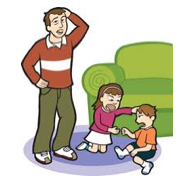To Spank or NOT to Spank
 Dear Dr. Darcy,
Dear Dr. Darcy,
My sister and I are both divorced and to save money we sold our homes and bought a new house and raise our children together. One of the things we did before the move was go into counseling to learn how this might effect the kids and we were told that if we’re going to do this we need to make a long-term commitment to living together until the youngest child is in college AND most importantly, we need to agree on how we’re going to raise the children because they should all be parented similarly. This brings me to my question. My sister believes in spanking and I never have. She doesn’t spank often, but I think her 5 year old is too old to be spanked. Mine are little as well and I never fully expressed a position on the whole spanking thing. Should parents spank?
ANSWER
Spanking is a hot topic – people tend to be either fully for or against it, and the country’s evenly divided on it. You may be surprised by where I fall on the spectrum: I am for spanking, provided the following criteria is met:
- I don’t believe in spanking a child who is 6 years old or older. Spanking should not be a regular method of punishment – it should be reserved as a last resort, and it should teach the child one thing: When you say NO, you mean NO. If your child hasn’t learned this lesson by age 5, you have failed and your child should not suffer the consequences of your shitty parenting skills by being spanked beyond an age by which any mediocre parent could have successfully taught this.
- Spanking should not be painful and should NEVER leave a mark. A child who is 5 years old or younger is far more sensitive to pain than you and I are. Consequently, NEVER spank a child when you are seeing red/angry. Spanking is NOT a stress release for a parent, and if you’re sticking to the rules and guidelines that you’ve set up, you shouldn’t be angry at the time that you spank. It should just be a natural progression of your child’s decisions.
- Your child should basically be able to predict when his/her behavior will result in a spanking. The entire goal of punishment is for the child to know with relative certainty which behaviors result in which punishment. The child’s consequences should not be influenced by your mood, your bad day, a fight you had with your ex-husband or financial struggles you may be experiencing. Parenting should ideally come from a place of Calm Leadership.
Spanking is most effective when combined with a discussion in which you explain which SPECIFIC behavior resulted in the spanking. Saying things like, “You know why you were spanked,” or “You need to listen when Mommy says No,” is NOT useful information. Instead, say, “Mommy put you in time out 4 times and you wouldn’t stay in the Time Out Chair, and that’s why you were spanked. Next time, stay in the Time Out Chair and you won’t be spanked. Do you understand?”
Provided your sister is on board with where you fall on the spanking spectrum (and the criteria for engaging in spanking), I think you should be fine. Just remember: If you don’t think your child has learned anything from the experience, you can be certain of one thing: The child has likely learned that the response to discomfort is to engage in physical aggression. Proceed with caution.
Writer’s Stats: Female, Lable-Averse.